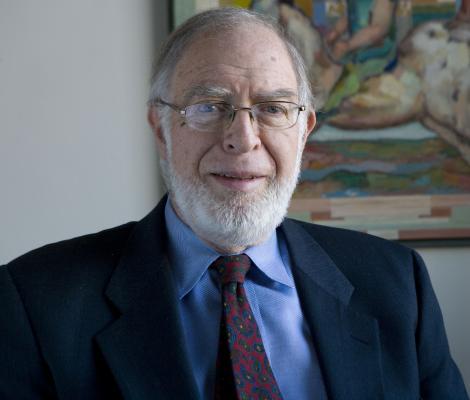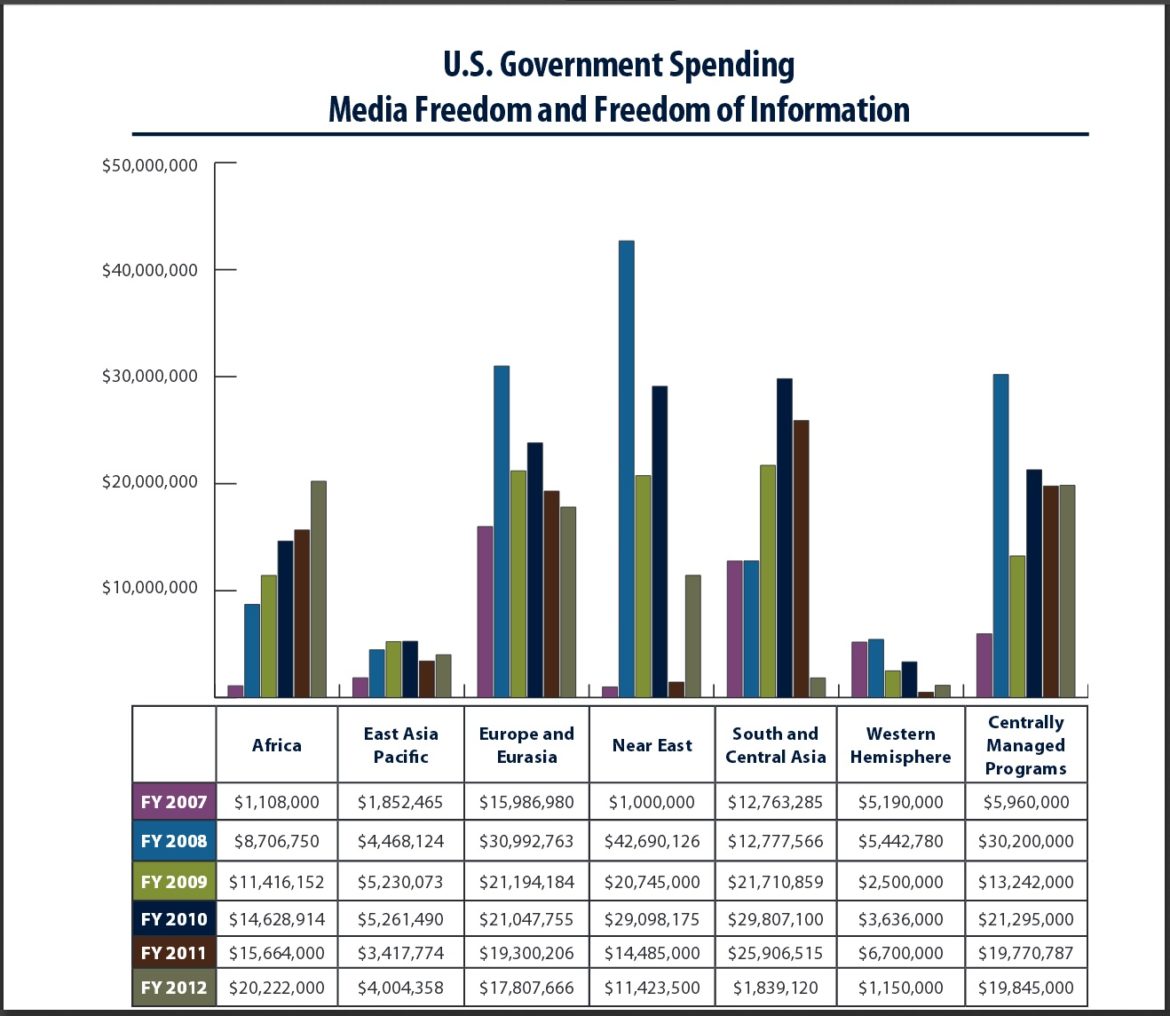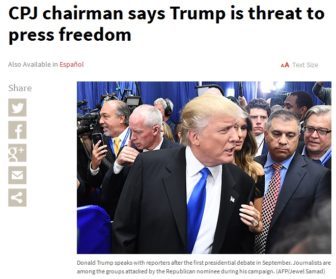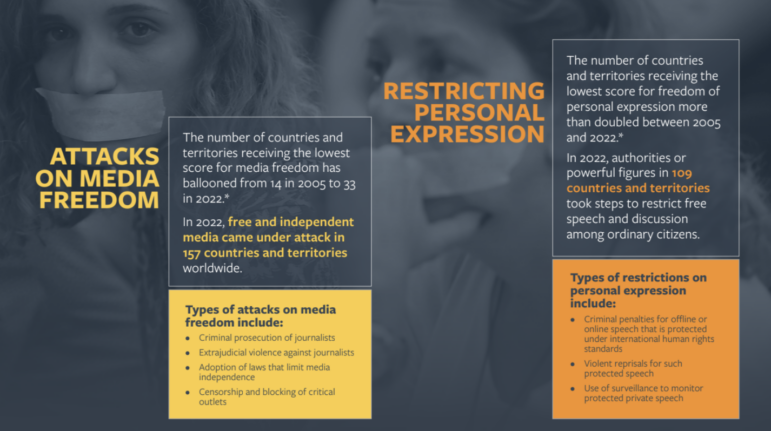

The Road Ahead: Int’l Media Assistance under Trump

Radio Free Europe’s Khadija Ismayilova, freed from prison this year. What happens to journalists like her if Washington no longer cares? (Photo: Meydan TV)
The post-election Presidential transition in the United States has raised many questions and concerns among the international development community about the future direction of funding for and engagement with overseas media and democracy assistance. Below, David E. Kaplan of the Global Investigative Journalism Network, Monroe E. Price of the Annenberg School for Communications, and Tara Susman-Peña of IREX respond to some of these questions and concerns. The following responses do not engage individual organizations.
Key Takeaways
- There will be no immediate effect on U.S. overseas development funding in the short term since the budget is set for the coming fiscal year and near-term programming is in the pipeline. Effects will be more pronounced one or two years from now.
- There are indications showing that substantial changes to USAID policy on overseas development funding can be expected.
- Changes in the management structure of broadcasters like Voice of America and Radio Free Europe/ Radio Liberty indicate a higher degree of politicization of broadcasting content.
- President-Elect Trump’s presidential campaign indicates that the field might come under extreme scrutiny.
- There is a concern among US-based organizations about a pressing need ‘within the US’ for the kind of media development initiatives undertaken globally.
About the responders:
 David E. Kaplan is executive director of the Global Investigative Journalism Network, the international association of investigative reporting organizations, with 145 member groups in 62 countries. He has worked in media development for over 20 years and served as editor of two editions of Empowering Independent Media: U.S. Efforts to Foster a Free Press and an Open Internet Around the World, published by the Center for International Media Assistance.
David E. Kaplan is executive director of the Global Investigative Journalism Network, the international association of investigative reporting organizations, with 145 member groups in 62 countries. He has worked in media development for over 20 years and served as editor of two editions of Empowering Independent Media: U.S. Efforts to Foster a Free Press and an Open Internet Around the World, published by the Center for International Media Assistance.
 Tara Susman-Peña is a senior technical advisor in IREX’s Center for Applied Learning and Impact and in the Information and Media practice. She specializes in the role of media, information, and innovation in governance, development, and resilience. Views expressed herein are her own and do not necessarily reflect views of IREX.
Tara Susman-Peña is a senior technical advisor in IREX’s Center for Applied Learning and Impact and in the Information and Media practice. She specializes in the role of media, information, and innovation in governance, development, and resilience. Views expressed herein are her own and do not necessarily reflect views of IREX.
 Monroe E. Price is the director of the Center for Global Communication Studies (CGCS) at the Annenberg School for Communication, and the Joseph and Sadie Danciger Professor of Law and Director of the Howard M. Squadron Program in Law, Media and Society at the Cardozo School of Law. As director of CGCS, Price works with a wide transnational network of regulators, scholars, and practitioners in Europe, Africa, Latin America, and Asia as well as in the United States.
Monroe E. Price is the director of the Center for Global Communication Studies (CGCS) at the Annenberg School for Communication, and the Joseph and Sadie Danciger Professor of Law and Director of the Howard M. Squadron Program in Law, Media and Society at the Cardozo School of Law. As director of CGCS, Price works with a wide transnational network of regulators, scholars, and practitioners in Europe, Africa, Latin America, and Asia as well as in the United States.
Is Donald Trump’s isolationist stance during his Presidential campaign going to reflect on the future of USAID’s overseas development funding?
David: Predicting what will happen under a Trump Administration is exceedingly difficult. Trump has proven himself impulsive and unpredictable, with a loose attachment to facts and frequent changes in policy positions. With that said, some trends are discernible: he is a more isolationist and transactional leader than any in modern US history. He does not see long-standing alliances and relationships, but a series of deals and interests to be negotiated. He is a fan of authoritarian regimes and not enamored of arguments in favor of human rights, democracy building, or independent media. Given that, the development community should brace itself for major changes in US overseas assistance. The budget is set for the coming fiscal year and should be unaffected, but following that, US foreign aid may be subject to sharp cuts and used much more as a tool for deal-making than as part of a global commitment to development. Possibly mitigating this is support for international assistance within portions of the Republican majorities in the US Congress, which may negotiate a sizeable commitment as part of a broader budget agreement.
Given that, the development community should brace itself for major changes in US overseas assistance. The budget is set for the coming fiscal year and should be unaffected, but following that, US foreign aid may be subject to sharp cuts and used much more as a tool for deal-making than as part of a global commitment to development. Possibly mitigating this is support for international assistance within portions of the Republican majorities in the US Congress, which may negotiate a sizeable commitment as part of a broader budget agreement.
Tara: I’m not sure there will be immediate effects (as near term programming is already in the pipeline), but I think we will see impacts after a year or two. I’m wary about making predictions for the Trump presidency, as most predictions about Trump have been very wrong so far. It is possible that overseas development funding will not be impacted much early on because it is a very small portion of the overall US budget. Overall, it seems inconceivable that there will not be some significant negative impact.
Can a fundamental change in USAID policy on overseas development assistance be expected?

US Department of State and USAID spending on media freedom and freedom of information through 2012. Source: CIMA.
David: Yes. A more moderate tone could emerge when Trump becomes president, but indications from his cabinet appointees are that his administration will have a very hard-line, America-first approach. Governments, agencies, NGOs, and others who depend on US international assistance should be preparing now to cope with major cuts in support. If Washington does continue significant support to media development, we may see attempts to interfere with and steer editorial content.
Tara: Signs are there. What this will mean for actual activities is still uncertain, but people are nervous. I think there is a lot that will be tested over the next four years about how well American democracy works ‘as a system’. If checks and balances are truly in place, there will be negative ripple effects, but we may be able to hope for a few rays of sunshine- like PEPFAR (The United States President’s Emergency Plan for AIDS Relief) funding under George W. Bush. If the system is more vulnerable than we might hope, the results could be catastrophic in many areas, including for development assistance.
As per a recent amendment inserted into the National Defense Authorization Act, the US Senate voted to abolish the Broadcasting Board of Governors (BBG) of Voice of America and Radio Free Europe/ Radio Liberty thereby bringing VOA and RFE/ RL under the direction of a Chief Executive appointed by the President. Can these outlets still act as standalone examples of independent media where access to fair and accurate information is scarce?
 David: Unlikely. US government-financed broadcasting services have long struggled to be professional and independent. Trump’s antipathy to the media, combined with centralizing control of the services under a political appointee, makes scenarios likely in which budgets are cut, broadcasts become more politicized, and quality staff leave. On the other hand, the blitz of disinformation, propaganda, and fake news has alarmed Republican as well as Democratic lawmakers in Washington, so Congress may act to preserve and even augment these programs.
David: Unlikely. US government-financed broadcasting services have long struggled to be professional and independent. Trump’s antipathy to the media, combined with centralizing control of the services under a political appointee, makes scenarios likely in which budgets are cut, broadcasts become more politicized, and quality staff leave. On the other hand, the blitz of disinformation, propaganda, and fake news has alarmed Republican as well as Democratic lawmakers in Washington, so Congress may act to preserve and even augment these programs.
Monroe: There have been long-standing issues of management and identity crisis within the VOA and RFE/ RL. If the dissolution of the BBG is directed towards simplifying governance, it might be helpful. However, it does not engage with the main concerns. One could say that two main models of international broadcasting are emerging- polar positions really. The BBC World Service model of a full-fledged news service (and surrogates) and RT- an instrumental entity seeking to achieve articulable foreign policy goals for the sponsoring country and using a broad array of tactics (often questionable) to accomplish those goals. Of course much is in between (noble surrogates, diaspora government supported broadcasting) and what might be called cosmetic instrumentalism, as is the case with China’s CCTV 9.
If international broadcasting becomes a method for proclaiming America’s greatness, maybe even contributing to it, there is a substantially tweaked VOA leaning toward BBC effort. It could be a radio or multi-platform effort that trumpets Trumpism. It could be Trumpism promotion as a self-perceived ‘variant’ on democracy promotion. It could be fostering abroad the brand of governance that is ascendant at home. There could be a new partnership radio among new friend regimes that have a specific take on redefined participation, an alliance of like-minded regimes or governments. There might be a thorough review of which audiences merit international broadcasting direct thrust and what kind. Even the function of surrogate radio may be to emphasize different streams of thought within the country-target. The very important current question might be the relation of international broadcasting to ‘Fake News’.
International broadcasters can contribute to the idea of a core commons of information or, has been seen, they can destabilize and enhance the uncertainty of factlessness. An ‘independent’ international broadcaster would have one take on these issues. But the new administration may have different views: destabilize where necessary, even if there is a tightly held set of beliefs that need to be dislodged. The capacity to unleash international broadcasting, or to curtail it, could emerge as a bargaining chip. The problem with the current entities is that they are sufficiently ineffective that their use or disuse may not be much of a chip.
President-Elect Trump’s election campaign has involved incendiary comments against the freedom of the press. What concerns do these raise for the nature and direction of future US funding for media and democratization?
 David: There are good reasons why the board of the Committee to Protect Journalists declared Donald Trump “an unprecedented threat to the rights of journalists” and noted that he “has consistently betrayed First Amendment values.” Trump is quick to take offense to press coverage, has attacked individual journalists and their outlets both online and in person, filed multiple lawsuits to intimidate and harass reporters, and made the US news media an object of hate and derision during his campaign. In addition, he has vowed to change US libel laws to make it easier to sue journalists and win those lawsuits. Intolerant of a watchdog press at home, Trump seems unlikely to endorse US support to independent media overseas. Congress plays a key role in the federal budget process and could protect funds for media development and democratization, but there will likely be pressure to cut such programs and the field will come under unprecedented scrutiny.
David: There are good reasons why the board of the Committee to Protect Journalists declared Donald Trump “an unprecedented threat to the rights of journalists” and noted that he “has consistently betrayed First Amendment values.” Trump is quick to take offense to press coverage, has attacked individual journalists and their outlets both online and in person, filed multiple lawsuits to intimidate and harass reporters, and made the US news media an object of hate and derision during his campaign. In addition, he has vowed to change US libel laws to make it easier to sue journalists and win those lawsuits. Intolerant of a watchdog press at home, Trump seems unlikely to endorse US support to independent media overseas. Congress plays a key role in the federal budget process and could protect funds for media development and democratization, but there will likely be pressure to cut such programs and the field will come under unprecedented scrutiny.
Tara: The new concern for US-based organizations is the pressing need ‘within the US’ for the type of work we do globally. The increasingly fragmented, overloaded, and unreliable state of journalism, social media, and media literacy in the United States certainly significantly contributed to the election of Trump. Clearly we cannot take democracy and its key areas of support (i.e. a free, independent media system) for granted – backsliding is now clearly a possibility in any context. We cannot hope to help abroad unless we are attentive to the cracks in our own foundation. In 2017, IREX will be undertaking new research and other initiatives to understand, more deeply, the current fraught state of affairs and identify a path forward.
 This post first appeared in the newsletter of the Global Forum for Media Development and is reproduced with permission. GFMD is an international membership network of media assistance groups that highlights the importance of independent, pluralistic, and sustainable media in social and economic development. GIJN is one of more than 175 member organizations.
This post first appeared in the newsletter of the Global Forum for Media Development and is reproduced with permission. GFMD is an international membership network of media assistance groups that highlights the importance of independent, pluralistic, and sustainable media in social and economic development. GIJN is one of more than 175 member organizations.









